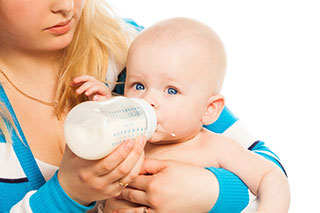 Baby bottle decay is an issue that parents should take seriously to protect the health of their little one's first set of teeth. While baby teeth are temporary, they play a vital role in your child's overall oral health and development. Preventing baby bottle decay requires a clear plan and consistent effort, but the good news is that it's completely achievable with some simple yet effective steps.
Baby bottle decay is an issue that parents should take seriously to protect the health of their little one's first set of teeth. While baby teeth are temporary, they play a vital role in your child's overall oral health and development. Preventing baby bottle decay requires a clear plan and consistent effort, but the good news is that it's completely achievable with some simple yet effective steps.
What Is Baby Bottle Decay?
Baby bottle decay, also known as early childhood caries, occurs when a child's teeth are frequently exposed to sugary liquids. This condition typically affects the upper front teeth but can also spread to others. The sugary fluids from milk, formula, or juice mix with bacteria in the mouth to create acids that erode tooth enamel over time, leading to cavities.
The Importance of Healthy Baby Teeth
Healthy baby teeth are essential for chewing, speaking, and maintaining the structure of a child's jaw and permanent teeth. Losing baby teeth prematurely due to decay may lead to misalignment as adult teeth grow in or even pain and infection. Taking early measures to shield baby teeth sets the foundation for a lifetime of good oral hygiene habits and health.
Common Causes of Baby Bottle Decay
Understanding the causes of baby bottle decay is the first step to prevention. Here are the most common contributors:
- Prolonged Bottle Use: Allowing your child to fall asleep with a bottle of milk, juice, or another sugary drink can cause prolonged exposure to sugar, increasing the risk of decay.
- Frequent Snacking or Sipping: Continuous sipping or grazing throughout the day exposes teeth to sugar and increases acid production.
- Improper Cleaning: Failing to clean an infant's gum line or teeth properly after feedings allows bacteria to thrive.
- Sugary Drinks: Offering sugary liquids as the main source of hydration plays a significant role in promoting decay.
Tips to Prevent Baby Bottle Decay
While baby bottle decay may sound daunting, it's entirely avoidable with the right preventative measures. Here's how to keep your little one's teeth healthy:
Start Healthy Habits Early
Start caring for your baby's oral health early by gently wiping their gums with a soft, damp cloth, even before their first tooth appears. Once teeth begin to come in, switch to a small, soft-bristled toothbrush and brush twice daily using water or an infant-friendly toothpaste. Establishing these habits early sets the foundation for a lifetime of healthy smiles.
Say "No" to Bedtime Bottles
Avoid letting your baby sleep with a bottle of milk or juice. If your baby needs soothing before bedtime or during naps, offer a bottle or sippy cup of water instead. This small adjustment makes a significant difference in reducing sugar exposure.
Transition to a Cup
Wean your child off bottles and onto a regular cup as soon as they are ready. The sooner you make the switch, the less likely your child is to develop habits that can lead to prolonged sugar contact with teeth.
Choose Healthy Drinks
Limit sugary drinks and instead offer plain water or milk at mealtimes. If juice is part of your baby's diet, keep it to a minimum and dilute it with water. Encourage water as their go-to beverage option.
Regular Dental Checkups
Schedule a dentist appointment as soon as your baby's first tooth makes an appearance or by their first birthday. Regular checkups allow early detection of any potential problems and familiarize your child with the dental office environment.
Teach Proper Dental Hygiene
When your child can hold a toothbrush, teach them to brush their teeth under your supervision. Make toothbrushing a fun part of their daily routine to foster excitement and good habits. As they grow older, introduce flossing and ensure their brushing technique is thorough.
Be Mindful of Pacifiers
Avoid dipping pacifiers in sweet substances such as honey or syrups, as this exposes your baby's teeth to unnecessary sugar. The same rule applies to teething toys or snacks.
Lead by Example
Children mimic their parents' behaviors, so practicing excellent dental hygiene in front of your child reinforces its importance. Brush and floss while explaining why oral health matters.
What to Do if Decay Is Already Present
If you notice signs of baby bottle decay, such as white spots or discoloration on your child's teeth, seek advice from a pediatric dentist immediately. Professional intervention can prevent further damage and safeguard your child's oral health.
A Foundation for a Healthy Smile
Preventing baby bottle decay may seem like a small step, but it has an enormous impact on your child's oral health and development. With care, patience, and consistency, you're setting a lifetime foundation for oral health and confidence.
For more information, contact our office.
